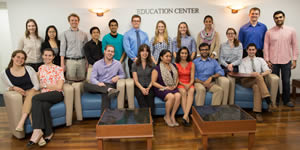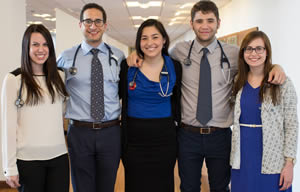

Caring for Community
ECHO at 16: The Free Clinic Grows — and Reverberates
On Saturday morning, Sept. 25, 1999, as its doors opened on Walton Avenue in the Bronx, the Einstein Community Health Outreach (ECHO) Free Clinic was little more than an ideal shared by a handful of Einstein students.
“Medical Students Run Free Local Clinic in the Bronx” details the
work of Einstein medical students in the ECHO ClinicNationally, health costs were rising at twice the rate of inflation, attempts to reform the healthcare system had failed in Congress and countless Americans were finding themselves without health insurance – or access to basic medical care.
Recognizing how critical that problem was in their own community, the students decided to do something about it. With supervision and support from physicians provided by the Institute for Family Health (Institute), along with faculty volunteers from family and social medicine at Montefiore, ECHO began offering high-quality medical care at no charge – the first student-run, student-staffed clinic in New York City. The Institute also generously offered its clinic space at the Walton Family Health Center, from which ECHO could offer its free services.
Addressing Healthcare Inequities
Fast-forward 16 years.

Members of ECHO’s pre-clinical team, comprised of first- and second-year medical studentsECHO has now grown far beyond adolescence. Today, ECHO clinicians have treated thousands of underserved patients in more than 10,000 visits to the Walton Family Health Center. ECHO has inspired and served as a model for other student clinics across the country, including six in the New York area. At Einstein, more than 300 students – nearly half of those enrolled at the College of Medicine – volunteer with ECHO each year.
“It was quite a ride for me,” said Dr. Sarp Aksel, a member of the class of 2015 who served at ECHO throughout his Einstein education, including a stint as the clinic’s project director.
Dr. Aksel has seen ECHO grow physically, with an expansion of the Walton Avenue facility in 2012 that roughly doubled the amount of space for patient care. In fact, ECHO has grown beyond its walls in the past several years, bringing disease prevention to the Bronx community through local classroom talks and health fairs on topics such as healthy eating and tobacco use. And through growing referral relationships with healthcare providers, ECHO is increasing patient access to mental health treatment, dental care and other services.
“We’ve become more comprehensive, sort of a one-stop-shop for patients,” said Dr. Aksel.
A Welcome Presence

Members of ECHO’s clinical team, comprised of third- and fourth-year medical studentsDr. Sarah Nosal, the Institute’s chief medical information officer and medical director of its Urban Horizons Family Health Center, and an adjunct clinical instructor in family and social medicine at Montefiore, noted how vital the clinic has become for Bronx residents. “You come here on a Saturday morning, and by 8:30 there’s already a line of 20 people outside the door,” she said.
A lot has changed since Dr. Nosal, a 2004 Einstein graduate, began volunteering at ECHO as a first-year medical student. For example, the Institute has adopted an electronic medical record system that provides a more comprehensive look at each patient’s care. Einstein has made service at the clinic part of the third-year rotation in family and social medicine. Funding from the Robin Hood Foundation now provides support for two Institute clinicians to act as paid supervisors at ECHO. Other donors contribute through events such as the second annual “Evening with ECHO” gala, which in March raised $19,000 to support the clinic’s services.
Changes such as these have allowed ECHO to keep pace with needs that have grown dramatically since its early days. For example, while ECHO initially served mainly patients from the Bronx, it now provides care for uninsured adults from all five New York City boroughs, as well as parts of New Jersey and Pennsylvania.
“Even with the passage of the Affordable Care Act, people are still being left out,” observed Dr. Nosal.
Opportunities for Learning
Despite the changes, much about ECHO remains constant.
“Over the years, the common thread among all these students at the clinic is having sensitivity to the needs of others,” said Dr. Amarilys Cortijo, medical director of the Institute’s Mount Hope Family Practice, who serves as ECHO’s medical director. An adjunct clinical assistant professor in family and social medicine, she began working at ECHO in 2001. “I feel I’m passing along a passion for caring about others, for the sense of obligation to make society better,” she said.
Students such as Elizabeth Guevara agree. “At the clinic, I’ve realized that none of us are an island. I’m seeing the effect medicine can have … how relevant, how real it is to people,” said the first-year student, who recently worked as a patient advocate at ECHO and is now serving as project director. “We learn from the patients. It’s a privilege to be at the clinic and to be able to look through a window into their lives.”
A third-year student and former ECHO communications officer, Jessica Faiz, reflected on how she has already learned much from her interaction with patients at the clinic. “I think medicine should really be a partnership between the doctor and patient,” she said. “You need to know and respect the person you’re caring for. That’s one of the things you learn at ECHO, at a very early point in your medical education. It’s a two-way street.”
Posted on: Friday, July 10, 2015

Tablet Blog